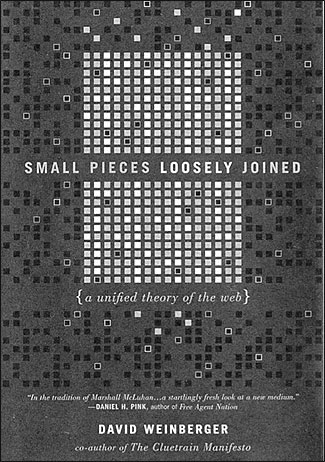Part of the problem with AOL Time Warner’s failure to capitalize on the Internet might be a basic misperception of what kind of medium the Internet is. Like all the other big media and telecommunication players, AOL Time Warner wanted the Internet to be the next television—a pervasive mass medium with a huge potential for advertising revenue. They wanted it so much, in fact, that they simply assumed consumers would want it, too. What these companies have failed to consider is that to its users, the Internet is not television. It is much more like the telephone or the postal service, a media outlet where advertising is regarded as intrusive junk and the emphasis is on active participation in communities, not passive consumerism.
That is one of the lessons taught by “Small Pieces Loosely Joined,” a thoughtful book by David Weinberger subtitled “A Unified Theory of the Web” (Perseus Publishing, 2002, $25).
Weinberger, who expounds his theories as the publisher of the Journal of the Hyperlinked Organization (www.hyperorg.com), an NPR commentator, writer and lecturer, discusses the fundamentals of the new world of the Internet in chapters titled “Space,” “Time,” “Perfection,” “Togetherness,” “Knowledge,” “Matter” and “Hope.” In “Space,” for example, he concludes that the fuss over the merger of AOL and Time Warner was driven largely by fear that new, giant entities like this one would crowd out smaller sites the same way a Wal-Mart drives local businesses out of a small town.
The fallacy, he says, is that this assumes the Web has a finite amount of space and that location counts. But that’s not the way the Internet works, he says: “It’s no harder to get to www.mom-and-pop.com than to www.megasite.com. Distance on the Web is measured by links, so the way to make your site ‘close’ to where your customers are is to get lots of places to point to it. How? By being interesting or worthwhile…. While big companies have an advantage [in the real world] when it comes to location because their fatter wallets can buy better positioning, big sites don’t have a leg up on being interesting. In fact, often it’s the contrary.”
The Web, he argues, has succeeded precisely because it was created without centralized management and control—it is a structure based not on “Thou shalt not,” but on “Thou canst.”
Weinberger is a philosopher, and his last chapter, “Hope,” uses terms we don’t often find connected to the Internet, at least on the business pages—“individualism,” “utilitarianism” and especially “morality.” The Web, he says, has created a place where we can shed the alienation induced by big media and rediscover our authentic selves as members of a community who engage in person-to-person communication and caring. That’s pretty heavy, but it sounds vaguely familiar—like the claims made by newspapers, back when they were small media, owned by real people who talked seriously about their responsibility to create an informed citizenry. It’s nice to know that Weinberger thinks there’s an institution around that can pick up that fallen torch.




